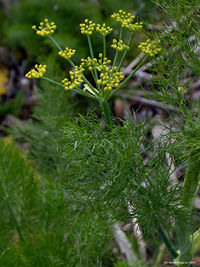Foeniculum vulgare
| See Also | Botanical Monographs |
|---|
Fennel is best known as a digestive tonic. To explore the characteristics, medicinal uses and prescribing considerations of this herb in more detail, check out the references indicated.[1], [2]
Contents
Characteristics
- Common Names: Fennel, Sweet fennel (var. dulce), Bitter fennel (var. vulgare)
- Family: Apiaceae (Umbelliferae)
- Habitat: Foeniculum vulgare is native to the Mediterranean but is cultivated and naturalized elsewhere. It prefers well-drained soil in sunny locations.
- Parts Used: Seeds (medicinal), herb, fresh bulb (culinary)
- Constituents: Volatile oil, flavonoids, coumarins, sterols, fixed oil, sugars
- Medicinal Actions: carminative/stomachic, aromatic, antiemetic, anti-inflammatory, antispasmodic, expectorant, hepatic, mild stimulant, slightly estrogenic, galactagogue, diuretic, orexigenic
Uses
Historical Uses:
Foeniculum vulgare was once used for snake bites and as an antidote to witchcraft. It has also been used for weight loss, longevity, and to promote lactation.
Medicinal Uses:
- flatulence, colic especially in infants, mild spasmodic gastrointestinal complaints, griping from purgatives
- Other Conditions
- Kidney stones, teething, sore eyes (eyewash), agalorrhea, catarrh of the upper respiratory tract
Prescribing Considerations
The information provided is intended to augment the treatment from a naturopathic doctor or other trained medical professional. Although most herbs are generally safe, it is recommended that you avoid self-prescribing especially when there is an underlying ongoing medical condition, if you are on any prescription medications or if you are pregnant or breastfeeding.
Formulations and Preparation
- Infusion - 1-2 tsp/cup three times daily, or before meals for flatulence
Safety
The safety and prescribing considerations for this herb include:[3], [4]
- Generally regarded as safe.
- Side-effects are limited but may include allergic hypersensitivity to Apiaceae (empirical), photosensitizing effects, fresh plant may cause contact dermatitis, lactation (in medicinal amounts).
- Cautions and Contraindications: avoid use of oil in liver disease, alcoholism, while breast feeding, or during the use of acetaminophen; pregnancy due to emmenagogue action (empirical), essential oil use with infants or small children under 2 y.o.a. (speculative), prolonged use (speculative), acid reflux (speculative)[2]
- Drug-Herb Interactions are rare.
References
- ↑ Boon Heather, Smith Michael (2009) 55 Most Common Medicinal Herbs: The Complete Natural Medicine Guide Second Edition Institute of Naturopathic Education and Research, CCNM Toronto.
- ↑ 2.0 2.1 Godfrey Anthony, Saunders Paul, Barlow Kerry, Gowan Matt (2011) Principles and Practices of Naturopathic Botanical Medicine, Advanced Botanical Medicine. V3 CCNM Press, Toronto.
- ↑ Stargrove Mitchell Bebell, Treasure Jonathan, McKee Dwight L (2008) Herb, Nutrient and Drug Interactions: Clinical Implications and Therapeutic Strategies.
- ↑ Brinker Francis (1997) Herbal Contraindications and Drug Interactions: Plus Herbal Adjuncts With Medicines, 4th Edition Eclectic Medical Publications.
